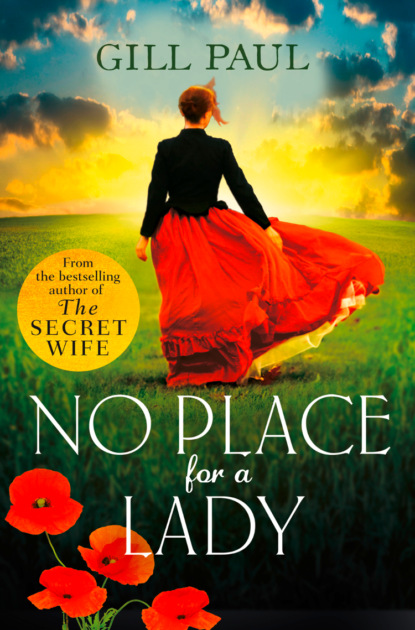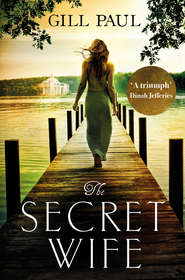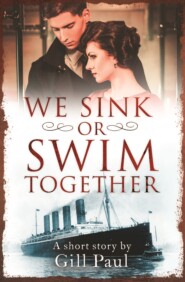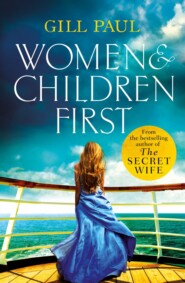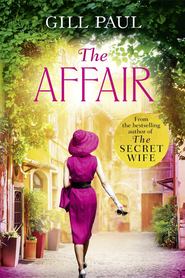По всем вопросам обращайтесь на: info@litportal.ru
(©) 2003-2024.
✖
No Place For A Lady: A sweeping wartime romance full of courage and passion
Автор
Год написания книги
2018
Настройки чтения
Размер шрифта
Высота строк
Поля
‘I am not staying behind,’ Adelaide declared firmly. Although Bill had returned to his duties he was still weakened by his illness and she could not contemplate waving goodbye to him. ‘I will go along by hook or by crook.’
‘And I’ll come too,’ cried Lucy. She could think of nothing worse than being left alone in this land of cholera and leeches.
Charlie told them that Lord Lucan intended to patrol the quayside watching every person boarding the ship, and they tried to think of ways to avoid his eagle gaze. Lucy suggested she could hide in her trunk, but Charlie pointed out that she would soon suffocate.
‘Why don’t we dress as soldiers?’ Adelaide suggested. ‘We could borrow some trousers and tunics and hide our hair under busbies.’
Lucy laughed at first but her friend was serious. She rushed into their tent and emerged some minutes later wearing Bill’s spare uniform. While the blue tunic was baggy on her, and the red trousers with a yellow stripe threatened to fall down at any moment, she could have passed for a man if you didn’t look too closely.
‘Charlie’s would be far too big for me. Perhaps I can borrow a spare uniform from Mrs Williams’ husband Stan, who is slighter,’ Lucy suggested, feeling a surge of excitement. ‘I’ll ask her. It doesn’t seem fair that soldiers’ wives are allowed to go along while we are not.’
‘They plan on putting the soldiers’ wives to work, cooking and laundering clothes,’ Adelaide explained, ‘but we can do that just as well.’
At daybreak on the 31st August, when the Hussars struck camp, Adelaide and Lucy were already dressed in their borrowed uniforms. It meant they couldn’t beg a lift on a gun carriage for the eight-mile march to Varna and even had to carry a bag apiece (although Charlie managed to arrange transport for Lucy’s trunk, the bath and her heaviest bags). Their feet blistered in army boots several sizes too large, stuffed with socks so they didn’t fall off, but both marched with determination and kept up with the others, chatting along the way.
‘By the by, there is something I wanted to ask you,’ Lucy said. ‘Did Charlie ever mention a girl called Susanna? He called that name in his sleep. I don’t want to embarrass him by asking about her, but wondered if she was perhaps a lady he used to be enamoured with before he met me? He is a man of seven and twenty years and must have courted other ladies before we met. Perhaps Bill knew her?’ Sensing Adelaide’s discomfort with the line of questioning she continued hurriedly, ‘Don’t worry; I am not a jealous type of woman.’
‘I … I think I have heard the name,’ Adelaide told her, hesitantly. ‘I believe there may have been ladies before you, but you must know you have nothing to worry about. Charlie dotes on you.’
‘I’m not worried. It’s just that he seemed to feel so passionately about her.’
‘I’m sure one day he will tell you about her.’
‘Won’t you tell me?’ Lucy pleaded.
‘It’s not my place …’ Adelaide began, then cried, ‘Look! I see the ships ahead. We are almost there.’ None of Lucy’s questions could induce her to say any more.
On the quayside at Varna, crowds were milling and amongst them Lucy recognised Lord Lucan standing by the gangplank watching those boarding. Shoulder to shoulder, she and Adelaide pushed forwards, trying to adopt a masculine style of walking, keeping their heads down, and the Major General barely glanced at them as they hurried on board. They asked directions to the officers’ quarters, and were momentarily surprised to find Fanny Duberly there, already having commandeered the best cabin. She glared at them in their uniforms.
‘Hardly dignified, ladies,’ she remarked, making them burst into fits of giggles.
‘How did you get past Lord Lucan?’ Lucy snorted, looking at Adelaide in her trousers and fur busby.
‘I simply walked past. He wouldn’t dare to stop me. My husband and I are terribly good friends of Lord Raglan’s.’ She looked them up and down. ‘I must say, you two look ridiculous.’
This made Lucy and Adelaide laugh anew, partly with the relief of having achieved their aim and avoiding separation from their husbands. Charlie and Bill arrived later and congratulated them on the success of the ruse.
The crossing to the Crimean peninsula was only supposed to take around thirty-six hours and they decided to keep a low profile and eat in their cabins rather than in the officers’ dining hall. However, the ship was almost instantly becalmed in the waters of the Black Sea. It was twelve days before Lucy saw the coast of the Crimean peninsula, an ominous, shadowy vision through torrential gusts of diagonal rain.
PART THREE (#ulink_792ac34d-40ae-5fa7-97a6-f4222317db5c)
Chapter Nine (#ulink_5df603eb-bdc8-518c-b34c-945c562328e9)
15th September 1854
The Pimlico Charitable Hospital was situated near Westminster Cathedral and every day Dorothea’s driver took them on a route that passed the Palace of Westminster, still in the process of being rebuilt after a disastrous fire in 1834. Heaps of bricks were stacked in Whitehall, where builders always seemed to be standing around smoking and passing the time of day, reluctant to shift aside to let a carriage pass. From their accents it was clear many were Irish, refugees from the Great Famine that had recently swept that land and decimated the population. Dorothea often looked at them out of her carriage window, singled out one man in particular and wondered about his story: whether he had been able to bring his family over, or if he was here alone and attempting to send back money to his loved ones. The busy streets of London must feel very strange to these peasants who had earned their living from the soil until their potato crop failed catastrophically.
Dorothea was kept very busy at the hospital. Her role was to chat with patients, read to them and try to raise their spirits, but she was fascinated to learn the basics of wound dressing, and assisting doctors in blistering, cupping and blood-letting. Although it was not usual practice for ladies, the matron, Miss Alcock, realised that Dorothea was competent and allowed her to help with medical care, and she had rapidly become one of the most knowledgeable of the nursing staff. The patients were all destitute folk who required a letter from the charity commission guaranteeing their good character before they were admitted, so as to weed out the drunkards and criminal classes.
On her ward there was great interest in the progress of the war and Dorothea often read the newspaper to her patients, just as she had for Mr Peters. They cheered at the news that their brave boys had arrived in the Turkish lands then became frustrated at the delays in engaging in battle, wanting to crush the Russkies as soon as possible. In the final week of July, reports began to appear in The Times about a cholera outbreak amongst the troops at Varna. Dorothea followed the movements of the 8th Hussars with special interest and knew they were there. At first there was a short paragraph mentioning four deaths, then there were another six, most in the French camp, but by the second week of August it was reported that five hundred had died and Dorothea became seriously alarmed.
At breakfast the next day, she saw her father was reading reports from Varna and couldn’t help asking the news about the cholera. ‘I’m so terribly anxious about Lucy!’ she said. ‘We’ve had no word about how she is or whether she’s affected by the outbreak.’
Her father looked up, surprised. ‘But she is very well! I have received a letter from her.’
Dorothea was astonished. ‘What? A letter? Are you sure?’ She thought for a moment that he had imagined it. Since Lucy had left he was increasingly prone to believing his own flights of imagination and she had become convinced that the mental infirmity of old age had affected his reasoning.
‘Of course I’m sure. I read it myself. I have it in my study.’
‘Why on earth did you not tell me?’
Mr Gray returned to his reading. ‘It didn’t occur to me, I suppose. The letter was addressed to me.’
A wave of anger and hurt flushed Dorothea’s cheeks but she bit back a rebuke. Despite her certainty that he was senile, it was hard not to get cross with her father sometimes; she was still furious with him for giving his consent for Lucy and Charlie’s marriage. Dorothea had given him many strong reasons against the match and still he had agreed to it. He had always liked Lucy better; that was the honest truth. Perhaps it was because she reminded him of his late wife, or maybe because she was so pretty and blonde and far more adorable than plain, dutiful Dorothea with her dull brown locks and sharp features.
These days she found herself irritated by her father’s hypochondria. Every day he had some new symptom he wanted her to ask the hospital physicians about: a painful toenail, a slight rash on his chest, or difficulty with his bowel movements. She knew this was most likely a symptom of his senility, but found it hard to empathise. He was only in his mid-fifties. Surely, if he but tried, he could pull himself together?
‘Might I see the letter?’ Dorothea asked, her voice a little tetchy, and he sent Henderson to fetch it from his study with lengthy explanations as to its precise location.
When she at last held it in her hands, she read it rapidly. Lucy wrote gaily of the female friends she had made on the ship; she had always possessed a facility for female friendship, with her outgoing nature and lively conversation. Even as a child, whenever there was a guest in the house Lucy would be nearby, asking questions and charming them with her pretty manners. She loved to be in company. It cheered Dorothea to read the letter until she checked the date and realised that it had been written three months previously when their ship stopped off in Malta, long before the cholera outbreak.
‘Did you reply?’ she asked, but her father shook his head. His mouth was full of buttered roll so she had to wait for his reply.
‘I didn’t know where to write,’ he said, wiping buttery crumbs from his lips.
Poor Lucy! She must think they had both abandoned her. Dorothea had not written again after the impassioned letter she sent on the eve of their departure had received no reply, but now she decided to try once more. She had no idea if the letter would get through to Varna but she could at least attempt to reach her sister.
‘My dear Lucy,’ she wrote. ‘Father and I think of you constantly and pray for your good health. We have read of the cholera affecting our troops and are anxious to know you are safe.’ She advised her to avoid foul, stuffy atmospheres or handling the bodily fluids of infected patients, then added more tips such as cooking fruit before eating it and drinking plenty of water to avoiding overheating in the warm weather. ‘I will ask at the hospital about the treatments they use for those who fall ill, and will write again anon. But of course prevention is by far the best course.’ In the last paragraph she sent her warmest regards to Charlie, and said she wished them both well. ‘Please take care of yourself,’ she wrote, closing her eyes in silent prayer that Lucy would be spared.
She sent Henderson to post the letter, addressed care of the 8th Hussars, and instantly felt a wave of relief that communication was once again opened between them, albeit one-sided. Perhaps she would write every week so that Lucy would receive regular correspondence from home. Even if she chose not to reply, she would know that Dorothea still loved her and was thinking of her.
As chance would have it, a letter from Lucy arrived just a few days later, crossing hers in the post. Yet again it was addressed to their father but this time he showed it to Dorothea at once. She could read her sister’s anxiety between the lines and felt an acute pang of missing her. It was clear that Lucy wanted advice from her. ‘If there should be some medicines available in London both to prevent and to cure this dreaded cholera, I would be most grateful if you could procure supplies and send them over. The doctors here seem at a loss,’ she wrote.
At the hospital the following day, Dorothea asked Miss Alcock, her ward matron, for advice and was told that the physicians in Pimlico Hospital sometimes gave opium for the pain, but they no longer believed in the use of calomel, a purgative. The best thing was to keep patients hydrated with sips of water and cool their heads until the fever passed. The sister told her that there was currently an outbreak in Soho and they were refusing to take any patients from the area for fear of it spreading within the hospital.
‘What is the mortality rate?’ Dorothea asked, and wished she hadn’t when Miss Alcock replied that it seemed as high as twelve per cent in some areas. Pray God it did not kill twelve per cent of the army in Varna. Pray God Lucy was safe.
Normally the physicians didn’t deign to speak with the nurses. However, that afternoon, Mr Clarence, a particularly amiable young physician, came to visit the acute cases and on his way out, Dorothea was bold enough to accost him and ask his views on cholera prevention and treatment.
‘It’s interesting you should ask,’ he said, ‘as I was discussing it this very morning with Mr John Snow, a colleague at University College. He has analysed the Soho outbreak with great rigour and become convinced that every single sufferer had drunk water from the pump at the corner of Broad Street and Cambridge Street. He has long believed cholera is not an airborne disease; otherwise it would surely affect the lungs in the first instance. I can see his point there.’ He paused to ensure she was following.
Dorothea frowned. ‘Whereas it affects the digestive system, so that points to the cause being something ingested?’
‘Precisely.’ He nodded eagerly. ‘Mr Snow persuaded the Board of Guardians of the parish to remove the handle, thus making the pump unusable and, lo and behold, cases of cholera infection dropped away rapidly. His own analysis of the water found white particles of unknown origin. Of course, much more research is required but it seems to me prima facie evidence for a waterborne illness. It could also be borne by contaminated foods, I imagine, especially those in which water is used during preparation.’
Dorothea was alarmed. ‘My sister is in Varna with the troops. What advice should I send?’
‘Instruct her to boil all water before use. And if infection occurs, keep the patient hydrated with sips of cooled boiled water. That’s all that is being done with the Soho victims and so far the recovery rate is much improved on previous outbreaks.’





